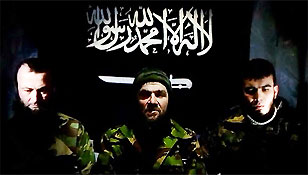|
|
|
From left to right: Khamzat, the commander of the Riyad-us-Saliheen Martyr Brigade; Doku Umarov, the leader of the Caucasus Emirate; and Saifullah, the suicide bomber in the deadly Jan. 24 suicide attack at Domodedovo International Airport in Moscow that killed 35 people. |
The Islamic Caucasus Emirate announced today that a yearlong split between its leadership and an influential faction in Chechnya has been resolved, and the Chechen commanders have again sworn loyalty to Emir Doku Umarov.
The dispute, which began last summer when Umarov was forced to resign by three senior Chechen commanders and an Arab who served as an emissary to al Qaeda, was resolved after a monthlong Sharia, or Islamic, court announced its findings. The Sharia court ruled in favor of Umarov, according to a statement released by Kavkaz Center, a propaganda arm of the Caucasus Emirate.
“As a result of Sharia trial, Chechen commanders who withdrew the oath of allegiance a year ago have renewed their oath to Emir of the Caucasus Emirate Doku Abu Usman (Doku Umarov), who is also the head the Province of Nokhchicho (Chechnya),” the Kavkaz Center statement said.
Umarov “reorganized” the command structure “of the armed forces” of Chechnya, disbanding the so-called “eastern and south-western fronts” and dividing the province “into military sectors,” according to the statement.
Amir Khamzat, the commander of the Riyad-us-Saliheen Martyr Brigade, the Caucasus Emirate’s suicide battalions, was named the commander of the western sector. Amir Hussein, or Hussein Gakayev, one of the Chechen commanders who sought to usurp Umarov during the summer of 2010, was named to lead the eastern sector. Umarov remained the overall commander of Chechen forces.
The two other Chechen commanders who sought to overthrow Umarov, Aslambek Vadalov and Tarkhan Gaziyev, also re-affirmed their allegiance to Umarov, according to Kavkaz Center.
Last year’s attempt to overthrow Umarov was led by Vadalov. Among those backing Vadalov were Gakayev, Gaziyev, and Yusuf Mohammed al Emirat, an Arab al Qaeda commander who is better known as Muhannad. They forced Umarov to renounce his position as leader of the Caucasus Emirate. The video of Umarov’s statement was released on the Internet and published by Kavkaz Center. Vadalov was then named Emir of the Caucasus Emirate.
But several days later, Umarov retracted his resignation, and claimed that his original statement “was completely fabricated.” Umarov later accused Muhannad of being “the main organizer of fitna (split/discord) among the Mujahideen” in Chechnya and called for him to re-affirm his allegiance. Umarov relieved Muhannad from command, but the Arab commander continued to fight in Chechnya.
Top Caucasus Emirate leaders, including Sayfullah, the group’s qadi, or “supreme judge,” and the emir of Dagestan; and Emir Adam, the governor of Ingushetia province, both issued statements pledging their loyalty to Umarov and urged others to keep their oath of allegiance. Khamzat also announced his support for Umarov.
Muhannad was killed by Russian counterterrorism forces during a raid in Chechnya on April 21. His death is thought to have paved the way for reconciliation between the Chechen commanders and the leadership of the Caucasus Emirate.
For more information on Doku Umarov, the Islamic Caucasus Emirate, and its war with Russia, see LWJ report, 35 killed in suicide attack at Moscow airport.








